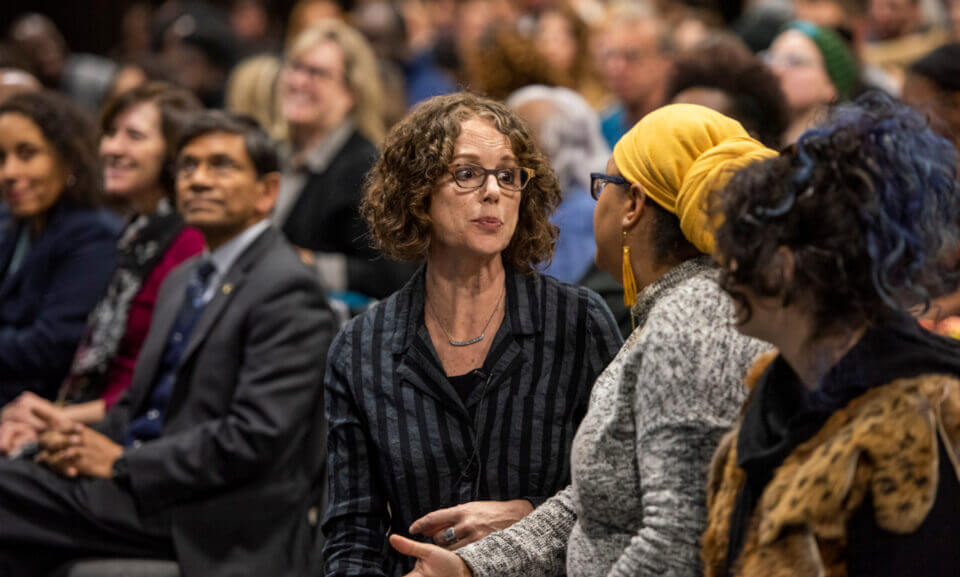
“I go through a whole analysis of that and why—statistically speaking—you’re basically making a very broad statement about white people in general based on one observation in one Jeopardy! episode.”
On January 29th, Merion West editor Erich J. Prince was joined by Jonathan Church to discuss his recent book Reinventing Racism: Why “White Fragility” Is the Wrong Way to Think About Racial Inequality, which was released in December. Mr. Church is a contributor at Merion West, as well as at a number of other publications, and he frequently writes about economics, as well as about issues dealing with race. During the interview, Mr. Church discusses how he first became interested in the topics that would eventually give rise to his book, precisely where he believes Robin DiAngelo’s 2018 book White Fragility goes awry, and why so many corporations and cultural institutions appear to have embraced critical race theory despite numerous and persuasive objections to the discipline.
To start off, Jonathan, can you talk about how you got interested in this topic and when?
I would say there were two steps or two developments. In 2016, I started writing a weekly column for The Good Men Project, a very progressive outlet. I was writing about various social justice-type issues. I don’t really consider myself totally Right or totally Left, and even the center is problematic. But I certainly was sympathetic—and I am sympathetic—to various social justice causes. I had written articles about paid leave, about discriminatory job advertisements, a very long essay about #MeToo, and how men should be thinking more about what they’ve done wrong rather than what they’ve really done right.
I was thinking about various issues in social justice, and a couple of articles dealt with white privilege and whiteness and allyship. I’ve actually sort of been going back to them recently, reading them over, and realizing that I had made intermittent references to “white fragility”—not knowing at the time that I was ever going to make anything of it.
In August of 2018, I was driving back from South Carolina, and I had just forwarded an article I’d written about how social justice activists sometimes have a tendency towards confirmation bias. And the reaction I got was simply, why are you always so fragile about this stuff? I tried to sort of defend the position—not too much, this was all by text—but the only response I kept getting was, “Why so fragile?” And it was getting a bit sarcastic and mocking. The thought that occurred to me was that white fragility was the new bourgeois. Back in the last century, a defense of capitalism or a critique of socialism would be simply dismissed as bourgeois. And so I wrote an article that ended up in Quillette and was well-received. Then a couple of months later, I wrote a long one for Areo. Then, I was kind of just plunging in; over the next year or so, I wrote several articles about it. I was reading up on the whole literature, all of Robin DiAngelo’s work—at least that which is available—and just developing a systematic critique of it. She calls white fragility one aspect of whiteness, but as I studied it, it struck me as a theory in itself.
One of the things listening to you that strikes me is this comparison of this class struggle of the 19th century and these groups of bourgeois, proletariat. Now, you’re suggesting that there is a sort of parallel now where white people are the bourgeois. Then, there’s the other group, and that’s non-white people—is it a similar sort of dynamic?
That’s the way I saw it. When it comes to worldview, I guess you could say politically—or on these issues—I do tend to be a little bit more skeptical or resistant to collectivist type of paradigms or frameworks or lenses, seeing people in terms of group, social identity: the whole intersectional framework where we define ourselves by means of the social groups that we intersect with, whether by class, race, gender, or what have you. I’m not saying that there’s no validity to the intersectionality paradigm, and I’m not saying that it’s not at all useful to conduct analyses at the group level. However, I am skeptical of the ideological bent that it tends to gives rise to. So, in this context, with respect to, say, whiteness or the critical whiteness studies, I guess the central two criticisms is that you have this reification fallacy; you have an abstraction like whiteness taking on a material existence, and I guess maybe more transparently or clearly, it sort of gives rise to the fallacy of ambiguity.
In other words, what is whiteness? It sort of becomes a blank screen in which we project our own meanings. So anyway, circling back to your question, this is in the context of race, and bourgeois arises in the context of class. Race and class are two types of groups that, in this intersectionality paradigm, we define ourselves through. I tend to be resistant to that—not because they’re entirely useless because they’re not, but it becomes these exegetical heuristics in a sense. They become so reflexive in the way we think about things that social justice activism in general, to the extent that it’s become kind of a crusade; there is just a tendency towards confirmation bias, to availability bias. There’s a sense to just see everything through those lenses, and then it ironically ends up simplifying a lived experience, which is a favored expression in this world. To me, lived experience is very specific to every individual. The nuances are just infinitely complex, and they end up getting just overly simplified by filtering them through these social categories. So, anyway, the short answer is yes. There’s this parallel and synonymy or whatever between whiteness and bourgeois, class, [and] race, and that is sort of what I had in mind.
One of the things that strikes with your book and with some of the articles that, in many respects, gave rise to the book is that you focus a lot on logical fallacies that Robin DiAngelo, in your telling, falls prey to. Can you talk about a couple of these that stand out to you?
The one that really stands out to me is the genetic fallacy, and that connects to the last thing I was talking about with respect to social identity. There’s this phrase, “That’s according to you,” which I often encounter with my interlocutors, if you will, from the world of social justice activism, particularly [my] sibling. The idea is that you attempt to formulate an argument or an analysis or an opinion or a perspective, and the response is not an evaluation of what you’re saying on the merits but essentially the idea that “that’s according to you,” as if that’s really the be-all and end-all of the evaluation. If you really wanted to parse through it, you get a sense of what that is getting at.
It’s notions about power and privilege and objectivity. And, if you really want to probe into it, you can find good points. But it becomes very problematic because—in being kind of a showstopper with “That’s according to you,” end of story—you get the Kafka trap stuff, but it’s really just saying that your argument just comes down to a matter of perspective based on social identity; it’s not based on the merits, whether factually, empirically, logically. This is true even lived experience-wise because when you invoke that “that’s according to you” defense or critique, you’re tying it into basically a framework of ideological rectitude. It’s just “you’re white,” that’s it, end of story or something along those lines. So, the genetic fallacy really stands out.
I’ve studied this enough to understand what DiAngelo’s whiteness studies are trying to get at in terms of the way that social constructs, social frameworks, social perspectives can skew and distort how we go about things. For instance, there’s the way the statistics might have been manipulated in the past in order to reinforce our biases or prejudices about race, ethnicity, or what have you. But if you’re going to say that, you have to make that argument. For instance, there’s a book called White Logic, White Methods, which makes a lot of these types of arguments, in a very rigorous way; they’re very robust. The title, however, really, I think undermines the book. It’s basically invoking this whiteness stuff. It sounds like, at least, it’s discrediting statistics and stuff, and, if you read the book, it’s really not. Again, the genetic fallacy really stands out. The other one is just the fallacy of ambiguity that I mentioned, where you construct all these arguments about racial inequality, where one of the central causal elements is whiteness. If we have a very open-ended and ambiguous understanding of what whiteness is (and that’s sort of in your premise), then that really boils down to the fallacy of ambiguity; we’re constructing an argument on the basis of a premise in which the terms of the premise are ambiguous. So, those are the main ones, and I could go on and on and on.
One of the main things that strikes me, Jonathan, is that unlike some critics of Robin DiAngelo (and others in her lane), you’ve spent a lot of time with her work. Reading your book, reading your articles, there’s no aura of just dismissing things out of hand. There is this kind of careful engagement with it. Secondly, as you said before with some of your work at The Good Men Project, you’re broadly sympathetic to some of these kinds of social justice ideas. So, I’m just wondering to what degree are you kind of an in-house critic, so to speak, of her ideas? What I mean is that your work doesn’t have this sense of just tearing her book down for the heck of it. It seems as though you’ve really ingested what she’s saying and are critiquing it pretty carefully.
I’m trying to. The thing is, I think I can’t deny that there is a degree of vehemence. I guess there’s a certain visceral element to this [that] goes back to the origins where you’re trying to convey a point about confirmation bias, and all you do is get dismissed as fragile. That frustration provides this motivational aspect to it, but, ultimately, it really is about trying to evaluate things on merits. So, one example that immediately comes to mind right now is: When you watch a DiAngelo lecture, there’s this tone of belligerence that comes across that is very, very ideological. One example is when she’s giving a lecture about a Jeopardy! episode (well, the Jeopardy! episode is one aspect of the lecture), she presents a board [that’s] empty except for the last column, which says “African-American History.” They’re all questions that haven’t been answered, and that’s supposed to be an instance of white racial illiteracy. I go through a whole analysis of that and why—statistically speaking—you’re basically making a very broad statement about white people in general based on one observation in one Jeopardy! episode.
The point I’m trying to illustrate at the moment, though, is that I confess a certain visceral degree or visceral element in the sense that it just strikes me as so analytically not robust. It just was not carefully thought out, and it’s very much in the way of sermonizing. Now, that said, to address your question, you still have to give her the benefit of the doubt. It’s like the medieval tradition of disquisition, where you’re essentially trying to reconstruct your opponent’s argument as best you can, better than your opponent can.
That’s what they used to tell us in college: You ought to give the person you’re reading as generous a reading as possible.
So, that is the idea. The point is not to be ideological; it’s not to, as she would say, gather sheep, so to speak, and she’s pretty explicit about that. She’s really just trying to gain adherents, and I referenced that in the book. But essentially, you have to acknowledge that she’s studied the voluminous literature on critical race theory [and] whiteness studies. She’s got a PhD in multicultural education; she’s in contact with many of the leading lights of this world, so she’s immersed in that literature and that world, and you have to understand that. I would say that one of the more remarkable discoveries is how much she, in my view at least, tends to misread or short-change the writings of people in that world: Charles Mills, Michel Foucault. But even Eduardo Bonilla-Silva, whom I disagree with a lot of what he says, but the analytical tone…he’s obviously a trained sociologist, and he does at least try to carefully make his argument. You don’t find that in DiAngelo.
Almost every paper, book, lecture, in my view, is really just an extension of her PhD dissertation. It’s a way to just keep reinforcing the same points, over and over with just repeated references to the same sources over and over. I just did not find her thinking to be very robust, and I think, in the end, it really undermines the things that you can find in critical race theory and whiteness studies that actually might have some merit. She just contributes to that overall tone of militancy and belligerence that you find in the more activist or extreme side of social justice activism. It tends to turn off potential allies rather than motivate them. I just think it’s very counterproductive. So, yes, the issue is just not to be ideological; the issue is to really try to immerse yourself in the same literature and come to your own conclusions. That is the intent, and I have tried to do that to the best of my ability.
Why do you think so many corporations, universities, cultural institutions, and the like are all so gaga over Robin DiAngelo?
I’ve been getting that question a few times now. When I first got it, I really didn’t have an answer.
Sorry to be unoriginal. [Laughs.] It’s just the in vogue thing to do now?
Essentially. It’s like implicit bias training. The research says that it doesn’t really work. The implicit bias paradigm has many problems with it. I’m not going to say it’s total junk science because first of all, I’m not a psychologist; I don’t really think of myself as being in a position to say that.
What I can say is that I’ve reviewed a lot of the literature, and I have corresponded with some of the more prominent critics of it, and what I think it is fair to say is that there is not a consensus within the field about its construct validity and about what it is and what it measures. I should say more specifically the implicit-association test. So, I just don’t think that there is a consensus. I also find—and this seems pretty certain—that the literature increasingly finds low test-retest correlations. You take the test today and tomorrow, and you won’t get the same results. It seems pretty clear, I think, that even the creators of the test themselves acknowledge—at least to some extent—that you can’t really rely on the test as a predictor of behavior. So, basically, it’s very problematic, and, yet, everybody has implicit bias trainings, even though you have all [these] problems in the literature and the research seems to indicate it doesn’t work.
It’s probably just path dependency. It came out in the late 90s. It created a whole big buzz. We finally had this big answer as to why you have persistent discrimination and inequality because of implicit bias. It planted itself in the culture, took roots, and grew under this big tree—everybody can see it. It seemed to provide an answer, and then it’s just path dependency. Then a whole second generation of research comes along and says, well not so fast, but it just already got ahead. Similarly, with White Fragility, I think, is that it came out [in] 2018, and there was a bit of a splash. Then, of course, [with] everything that happened last year, it just went through the roof.
Right, so I’d obviously heard about it from your articles at Merion West for the past couple of years. Then, it seemed to be in May and June of [2020], I was seeing it everywhere: in the mainstream press, people were mentioning that they were ordering the book. It seemed like everybody was reading it.
It was just a perfect storm. It was validated by leading scholars. Michael Eric Dyson was writing a foreword, and many other sociologists and other people were saying that this is great stuff. It just became popular. Then, all of the events of last year happened, and it was like we have an answer: This is what we need to do; we need to read White Fragility. And for those who really cared about doing something, it seemed to make a lot of sense. You could probably think of many, many examples. Oscar Wilde once said, “To be popular one must be a mediocrity,” but you can think of all sorts of examples—things that just become popular through a combination of events, and it’s just not that good. But people jump on the bandwagon because the leading lights say, “It’s a great work.”
I just didn’t think it was that good, but why do people read this? Why does corporate America want to read White Fragility? Why do they want implicit bias training? To use the tired, old phrase: woke capitalism. It’s not even anything really to do with capitalism per se; it’s just companies that are trying to promote their own brand and keep it in line with the social current, if you will. They all probably are very well-intentioned, and they want to do something positive. ESG, environmental social governance investing, is very big. I think it’s just a testament to how far—I guess that’s really your answer—to how much penetration into the general culture critical race theory [and] whiteness studies [have] made.
DiAngelo and others invoke Foucauldian discourse. We have knowledge classifications that are like powerful classifications. They’re classifications created or maintained by the powerful to stay in power. But the irony is that these categories like white fragility [and] whiteness have actually become very pervasive and promoted by many people who are institutional leaders whether in academia, corporate America, politics, or whatever. So, the irony of this is they’ve actually, in some sense, been very successful. I think one of the frustrations you have with the so-called Kafka trap of White Fragility is that you’ve had somebody like me (or maybe more ideologically inclined people) come along and say this is very problematic. But they just completely shut down and say, “Look, this is the way you’re supposed to look at it. We’ve made a lot of progress. We’ve published a generation or two of research and this is the correct way.” The irony is that they started off, [a] generation or two or three ago saying we, ourselves, (critical theory) are engaging in a critique of the prevailing paradigms of knowledge. But now this is the prevailing paradigm of knowledge, and you’re not supposed to question it. I think corporate America’s embrace of it is a manifestation of that.
So, last question, Jonathan, and you alluded to this with implicit bias training, the effectiveness of it. So, on one level, [in] your book you are critiquing a lot of the lines of argument by Robin DiAngelo; but, from a utilitarian sort of perspective, what do you think is the effect of her book in terms of promoting better relations between people of different races? Is it counterproductive? Is it making matters worse, so to speak?
That’s definitely my view. My view is that it’s a huge transaction cost, to put it in economic terms because it’s just so doctrinaire. It has a set paradigm that it wants to indoctrinate you with. It’s supposed to be about racial dialogue, and it’s supposed to be about listening, but as I’ve said before, listening is a necessary but not sufficient condition for understanding. In my view—and I’ve tried to lay this out carefully—it’s really about indoctrination, which not surprisingly gives rise to the defense mechanisms that are referred to as white fragility. So, yes, I think it’s very counterproductive. In terms of what she’s trying to accomplish in general, you would think it’s basically moving towards a more racially just world, but what does that mean, right? People have different ideas about what that means. Really for her, it’s an ongoing lifelong process; it never ends. That’s part of critical race theory paradigms.
Yes, I notice that often seems to be part and parcel of the worldview of some in the activist class. It doesn’t seem to ever end.
Yes, it’s everywhere, and it never ends.
We’ll wrap up there, Jonathan, thank you for chatting with me.
Thank you.










